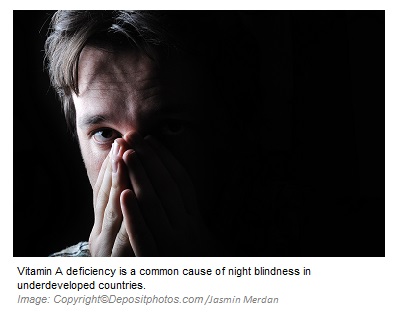Night blindness is having difficultly seeing in the darkness or in the low light environments.
 In medicine, it is called “nyctalopia”.
In medicine, it is called “nyctalopia”.
Potential contributing factors:
- Hereditary (retinitis pigmentosa).
- Cataract.
- Corrective refractive eye surgery.
- Vitamin A deficiency.
- Medications: phenothiazine family, and glaucoma medications.
- Zinc deficiency.
- Severe myopia (near-sightedness).
- Macular degeneration.
Nutritional Supports:
Restricted Foods:
- Processed foods.
- Foods high in saturated and trans-fats.
- Coffee: caffeine may reduce the absorption of vitamin A, zinc and copper.
- Soft drinks.
- Chocolate.
- Cocoa.
- Caffeinated drinks.
Recommended Foods:
- Foods high in vitamin A: cod liver oil, liver, carrots, broccoli florets, sweet potatoes, kale, spinach, pumpkin and collard green.
- Foods high in zinc: lentils, beans, and sunflower seeds.
- Foods high in bioflavonoids: berries.
- Foods high in Omega-3 fatty acids: fish, flaxseeds, hemp seeds, chia, and walnuts.
Recommended Supplements:
- Vitamin A: 5000 – 10000 IU a day.
- Lutein: 10 -20 mg a day.
- Zeaxanthin: 2 – 3 mg a day.
- Astaxanthin: 3 – 6 mg a day.
- Zinc: 25 – 50 mg a day.
- French Maritime Pine Bark Extract: 50 – 100 mg a day.
- Grape Seed Extract: 50 – 100 mg a day.
- Omega – 3 Fatty Acids: 1 – 3 grams a day.
Miscellaneous Suggestions:
- Liver detoxification.
- Colon cleansing.

